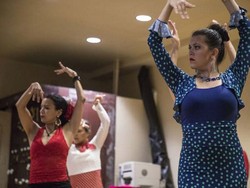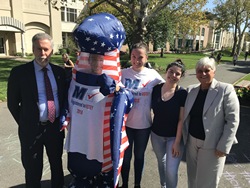David D’Amico, a detective from Monmouth County Prosecutor’s Office, spoke to students at the University on the severity of hate and bias crimes that continuously transpire in society on Thursday, Nov. 13 in Wilson Hall.
D’Amico explained that in the state of New Jersey, an individual can be persecuted for a bias crime.
The detective started his presentation by introducing his background and credentials. He has been a cop for 25 years, and at the turn of the century he applied and was accepted to Monmouth County’s Prosecutors Office. The Prosecutor’s Office is made up of specialized units. D’Amico’s particular unit deals with bias and criminal acts.
Tom McCarthy, Assistant Director of Counseling and Psychological Services, was the coordinator of this event. “We have been hosting this event at Monmouth for the last seven years,” said McCarthy.
D’Amico also initially referred to the audience as heroes, leaders and role models of Monmouth University.
Following his introduction, he shared a video clip of real footage broadcasting brutal examples of hate and violence that occurred in American history. Some of the scenes referred to 9/11, anti-semitism, and the Ku Klux Klan – all cases of hate still prevalent today.
Maryam Srouji, a freshman psychology major, was present during D’Amico’s presentation. “I’m a very sensitive person and I consider myself a pacifist, so to see just how ruthless and heartless people could be really hurt. The images of the lynchings and the attack on the World Trade Center made me cry,” said Srouji.
D’Amico said, “A hate crime is a criminal act motivated by one of the nine protected classes in NJ, the criminal statute is 2C:16-1 Bias Intimidation. In NJ law enforcement needs three elements to charge someone with a hate crime, first there must have been a crime committed, second the victim must have been selected because of one of the nine protected classes, and then the victim must have been intimidated by the actions of the perpetrator.”
In the state of NJ there is a total of 51 hate groups, according to a study conducted by the Southern Poverty Law Center. D’Amico deduces that NJ might have such a high number in comparison to other states because of its dense and diverse population. The number of hate groups in NJ has increased from 44 to 51 since the 2013. This may coincide with the recent ruling on same sex marriage in the state over the past year.
D’Amico believes that hate is a learned behavior. According to him, all humans have a value system that is built from factors such as beliefs, parenting, and peers.
Natalie Ciarocco, an associate professor of psychology, thinks that hate and prejudiceness also stems from the need to feel accepted. “People have a strong desire to bond with others. When we are with others we easily feel connected to them. The downside is that this leads to in-group favoritism. This refers to the tendency to favor any group we feel connected to over people in other groups (i.e., the out-group). This tendency is beginning of prejudice towards others,” she said.
The University, with the help of Monmouth University Police Department (MUPD), strives to take measures in regards to any examples of hate or bias crimes. The University’s Chief of Police, William McElrath, said, “The University Police Department responds to all bias crimes and incidents immediately. A follow-up investigation is then conducted by our Detective Bureau and Bias Crime Officer,” he said.
“The investigation must be in compliance with all the mandates of the Monmouth County Prosecutor Office,” continued McElrath.
According to McElrath, the University has come across three reported bias incidents since January. “All three incidents involves a graffiti comment being written in a public place,” he said.
D’Amico assumes that there are plausible ways of conquering hate in our society. He thinks that to conquer hate and prejudiceness individuals must be willing to walk a day in the in anothers shoes. He requested this of the audience.
D’Amico said, “If you are white I want you to think about being black, if you are black think about being hispanic, if you are hispanic think about being asian, if you are Catholic think about being Muslim, if you are Muslim think about being Hindu or Sikh, if you are straight I want you to think about being gay, and if you are gay I want you to think about being straight.” According to D’Amico everything has a foundation, including hate, and that is ignorance.
“We’ve come a long way but we still have a long way to go because of ignorance. Ignorance grows when people refuse to learn about people who are different than themselves,” said D’Amico.
At the conclusion of the discussion, Crone took a picture with the crowd of people who attended, which he later posted to his social media pages.
He stayed for an extra hour after the event to speak with students individually about their personal struggles.



